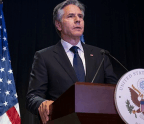Trump's defense in 2020 election case could conjure ghost of Nixon once more

The multiple criminal charges against former President Donald Trump are often described as unprecedented, and so they are. But Trump is not the first president to be named in a criminal indictment.
That distinction, such as it is, belongs to Richard Nixon, the 37th president of the United States, still in office in March 1974 when a specially appointed prosecutor named Leon Jaworski indicted Nixon aides and advisers for their roles in the Watergate scandal. They were all the president's men, but Nixon himself was named as an "unindicted co-conspirator."
That phrase was back in the news this week when Trump's latest indictment also identified (but did not name) six unindicted co-conspirators. Some of those individuals might still be charged in the ongoing prosecution, which alleges Trump led a multi-faceted effort to overturn the results of the 2020 election that he lost.
This is far from the first time the common, with the Senate acquitting him both times for want of a two-thirds majority.
You’re reading a preview, subscribe to read more.
Start your free 30 days





